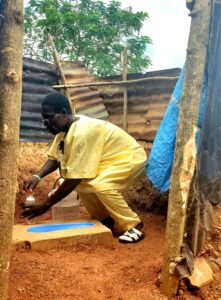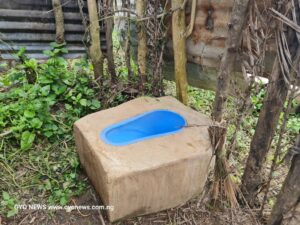Sola POPOOLA
183 years after it existence,JAGO, an obscured community in Ona-Ara Local Government, Ibadan ,Oyo State capital gained prominence as a result of the communal effort to improve hygiene and sanitation practices .


She urged residents of Oyo State to support the efforts of the government to end open defecation.
The 2021 Water Sanitation and Hygiene National Outcome Routine Mapping (WASHNORM) report revealed that about 5,020,920 residents, representing 53.7 per cent of the total population of Oyo State, practice open defecation, while about 3,621,520, representing 43 per cent use unimproved toilet facilities.
The report also said only 8.4 per cent of households have access to basic hand washing services.
Chief Oparinde said the community only had access to Osun River and about two borehole pumps, strategically placed in some spots within Jago. “When they use the bush, the faeces get washed into the river in the community, so we can not drink from it. There is no enough borehole for us to use in Jago.”
“The toilet project has ridden the community of open defecation. Before now, we used bushes around us to defecate. We perceived odours, and you can not trek a distance without stepping on faeces.
Constructing these toilets came as a huge relief not just to parents and children but also to the entire community.
“We had a series of pre-planning meetings with community members, during which we discussed the project and execution and made plans for the smooth start of the toilet construction,” Chief Oparinde said.
“I must acknowledge that the support from the community was overwhelming throughout the entire process, which began last year.”
Though Jago experienced a low rate of cholera, in the past, some who used bushes fell inside wells.
The vendors, involved with the distribution of toilet products along the supply chain, from initial sales to transportation and installation, showcasing the valuable roles of TBOs in Nigeria’s ambitious transformation in hygiene development and the growth of its sanitation economy.
One of the country’s Sustainable Development Goals was to achieve 100percent access to water services by 2030. Nigeria is currently on a mission to provide safer, cleaner, and more reliable sanitation infrastructure to everyone, across all strata of society.
As important ambassadors for better sanitation solutions, advocates of hygiene development in rural communities, and SATO customers, TBOs will be key facilitators to the achievement of this ambition.
The head of the TBO team, Mr. Adegboyega Kolawole spoke about the success and challenges in the business.
“Some people cannot afford one squirting-pan, which costs N15,000 now. So, many go for the option of satopan which costs just N2,500, but the construction, costs about N60,000”.“To construct one, we need 4 inches pipe, 4 inches elbow, cover, cement, and blocks,” he said.
With about 120 satopan and with more funding, there is opportunity for greater expansion of sanitation products and infrastructure into rural communities
Microfinance, or small loans that don’t require interests or collateral, should be offered to these rural communities that are long forgotten by government, as this could spur more low-cost toilets in the country.
TBO, which offers a total funding of around N60,000-N70,000 per toilet, works largely with governmental organisations, such as Oyo State Rural Water Supply and Sanitation Agency (RUWASSA), that offers water and sanitation services to villagers around the Oyo State.
The Federal Government selected some states for special intervention by the UNICEF on Programme on Education, Health, Nutrition, and Water Supply. Oyo State is one of the selected states for these UNICEF Programme. The Programme for Water Supply is under UNICEF – Assisted Water and Sanitation (WATSAN) Project.
The OYO RUWASSA commenced with the software components (Community Mobilization/Hygiene Education, Sanitation, etc) in 1992 in the Ministry of Health and later moved to the Governor’s Office. The hardware components are the geophysical survey, drilling operation, platform construction, Pump Installation, Latrine construction. Drilling operation commenced on 23rd February, 1993.